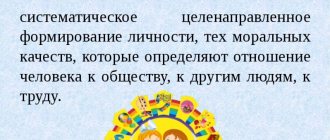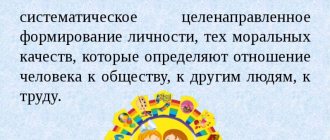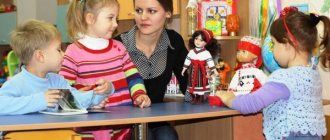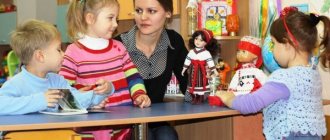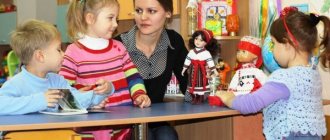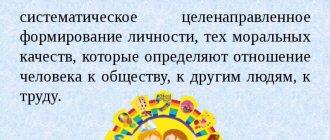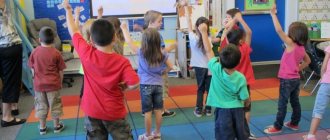Morality is a person’s internal attitude to act in accordance with conscience and free will, the individual’s internal requirements for himself. Morality is also understood as a set of norms of behavior for every person in society, the internal qualities of a person and their expression, which determine his behavior in society. Moral education is the process of forming a harmonious personality, developing a holistic value-semantic dominant in preschool children. Moral education is one of the most important stages in a child’s upbringing, necessary for his personal development in society. This process conveys to the child a system of generally accepted fundamental values that determine the relationships of people in society, in the family, as well as principles and norms based on the concepts of good and evil, truth and lies, positive and negative in a global sense. What are the main means and methods of moral education of preschool children? What is the role of moral education of preschool children in the family?
Main aspects of moral education of preschool age
The relevance of the problem of moral education is due to the crisis of modern society, in which there has been an erosion of moral norms, the importance of the institution of family, and spiritual values, which significantly complicates the path of personal development of a preschool child. Moral education is designed to contribute to the formation of a harmonious personality, aware of the norms and values that determine the foundations of relations between people in society.
The crisis of morality in society is facilitated by modern frivolous methods of raising children, in which the child receives the basics of moral education outside the family through means imposed by a demoralized society (for example, computer games that develop selfishness and cruelty).
Why should moral education begin at a very early age? During this period, the child is maximally open to emotional experience and empathy. The child takes the words and actions of adults for granted, without questioning them, which happens at an older age when the child learns to analyze words and actions, compare experiences and draw certain, not always correct, conclusions. The experience acquired by young children will later move into the category of what is proper, true, canonical, and beyond doubt.
Moral education in preschool age is implemented through a system of methods and means, but the main source of moral education and the formation of a harmonious personality of a child is his family. An auxiliary mechanism for the implementation of moral education of preschool children are kindergartens, whose role is to correct errors in raising a child in the family.
Working with parents
The spiritual and moral education of preschool children according to the Federal State Educational Standard is impossible without close cooperation between the family and the kindergarten or center. Employees of preschool institutions are also interested in helping parents who find themselves in difficult life situations.
There are several forms of cooperation that are actively practiced.
Questioning
Conducting surveys on various topics makes it possible to study the characteristics of the family and draw up a social passport.
This technique is also practical. If it turns out that the family belongs to the disadvantaged category, then they begin to work with it using a different method.
Conducting parent meetings
These are mandatory accountable events. In recent years, so-called non-traditional parent meetings have become widespread, at which parents are invited to play games and complete quests.
Exhibitions showcasing the works of family creativity
A form of interaction when the teacher communicates not only with the child, but also with his family.
First, the teacher announces the theme of the exhibition, then collects the works and designs them. Those who actively participate are celebrated with various certificates and encouraged.
Conducting master classes for children with parents
These are thematic events to which they invite specialists or organize master classes on their own. The purpose of such events is to organize joint communication between the child and the parent.
Celebrations
This is a traditional technique when, by certain dates, children learn poetry and dances, parents buy costumes and organize tea parties. This practice has existed for a long time, but its forms are constantly changing in accordance with modern requirements.
They begin to prepare for the celebration of the “New Year” or “March 8” 1.5 months in advance. In addition, it is considered traditional for preschool educational institutions to hold the “Autumn Festival”, as well as to draw up a program of events dedicated to “May 9”.
Basic methods of moral education of preschool children
Moral education of preschool children is a complex process of forming the child’s beliefs and value system, implemented through certain methods, which include:
- Persuasion and Conversation;
- Inspiration to action;
- Appeal to sympathy and empathy;
- Encouragement;
- Punishment.
At preschool age, the child does not yet understand what is good and what is bad, but he is maximally open to the emotional perception of the situation. Therefore, in the early period of moral education of preschoolers, standard methods are ineffective.
Many parents, in the process of educating morality in a child, assign the main role to the mechanisms of reward and punishment, incorrectly interpreting these methods, reducing them to material reward and physical punishment or material deprivation. As practice shows, this tactic is also ineffective in the long term, since physical and material deprivation is a manifestation of external moral control for preschool children. Moral education is designed to stimulate the manifestation of internal encouragement (oneself) and internal deprivation (punishment - unauthorized refusal of encouragement, benefit).
Methods of social and moral education of preschool children presentation for the lesson (senior group) on the topic
Slide 1
Methods of social and moral education of preschool children Prepared by Altunina Natalya Yuryevna as a teacher of the 1st qualification category
Slide 2
Methods of social and moral education of preschool children - Methods of developing skills and habits of behavior - Methods of forming moral ideas, judgments, assessments; -Methods of behavior correction.
Slide 3
Methods for developing skills and behavioral habits ensure that children accumulate practical experience in social behavior. 1) A method of teaching a child to positive forms of social behavior (saying hello and goodbye, thanking for a service, answering questions politely, treating things with care, etc. They are taught this through exercises that involve involving children in a variety of practical activities, including communicating with peers and adults (in natural and specially created situations).
Slide 4
2) The method of assignment in combination with the example of adults or other children. At the same time, the child should have a desire to be like, to imitate. If the example is reflected in the child’s activities, we can talk about its significance and active influence on the child’s personality. 3) A method of targeted observation organized by a teacher (for example, younger children observe friendly games of older preschoolers. This is not just a passive method, it nourishes children's experience, forms an attitude towards the phenomenon and positively influences behavior. You can use demonstration of action. This method is effective in developing skills cultural behavior in children.
Slide 5
4) The method of organizing by the teacher activities that are of a socially useful nature. (for example, collective work on cleaning the site, planting flowers, shrubs, etc.)
Slide 6
5) Method – children's game, especially role-playing game. It makes it possible to most freely and independently establish relationships with other children, choose topics, game goals and act on the basis of knowledge of norms and behavior, existing ideas about the phenomena of reality. The game allows an adult to clearly see the achievements and shortcomings in the level of moral development of the child and outline the tasks of his upbringing.
Slide 7
Methods for the formation of moral ideas, judgments, assessments; Conversations on ethical topics; Reading fiction; Story; Examination and discussion of paintings, illustrations, filmstrips; Beliefs. These methods are widely used both in educational activities and in the everyday life of children.
Slide 8
Behavior correction methods. Reward and punishment. When encouraging, the following pedagogical requirements must be taken into account: Encouragement must be done in a timely and skillful manner. Encouragement provides specific definitions, for example: “kind”, “polite”, etc. These words emphasize the moral meaning of actions. The encouragement must be deserved. You need to encourage only those actions that require physical, mental, moral effort. In any encouragement you need to know when to stop; you should not praise the same children. It is necessary to take into account age and individual characteristics.
Slide 9
Forms of punishment: reprimand, deprivation of affection, temporary refusal to talk and talk with the child, prohibition to do what you love, deprivation of communication with peers and promised pleasures, warning that others will find out about the act, discussion of the act by all family members or in a group of peers. Requirements for the use of punishment: Before punishing, you need to find out the reason for disobedience. Punishment must be fair for an immoral act. Punishment is not a mandatory method of education. Punishment requires great tact, patience, and caution. Punishments must be combined with demands. An adult must be unshakable in his decision, otherwise the child will hope for its cancellation. The teacher must anticipate the children’s reaction to punishment and try to make them realize the unacceptability of their actions. Punishment is based on respect for the child’s personality. Adults need to remember the extent of punishment. The harm of frequent punishment is obvious: the child begins to lie in order to avoid punishment or stops responding to it. Frequent punishments indicate the helplessness of the teacher.
Slide 11
With
Slide 12
Thank you for your attention
Basic means of moral education of preschool children
The thinking and ideas of a preschool child, whose moral education is realized through a certain system of means, are extremely concrete, so they need clear, understandable forms and symbols to understand such abstract concepts of moral principles as kindness, loyalty, gratitude, responsiveness, love, beauty and others. Among the main means of moral education of preschoolers are:
- Fairy tale;
- A game;
- Creative task, labor, human activity;
- Nature;
- Communication with both peers and adults;
- The collective - the children's environment - is one of the important means of moral education of preschoolers, allowing the child to develop and express his individuality within the framework of a specific society governed by its own laws and norms. This is one of the necessary mechanisms for instilling collectivism, which cannot be realized in any other conditions. The harmonious development of the individual is impossible without a team, since a person is a social being, living in society and being part of it. Raising collectivism in a child must inevitably overcome the contradiction - the suppression of the individual by the collective. Overcoming this problem independently will allow the child to learn to live and develop in society within the generally accepted framework of norms and morality.
These means of developing morality in a child are accessible and easily applicable in practice, both in the conditions of raising a child in a kindergarten and in the family.
The role of moral education of preschool children in the family
The fundamentals of moral education of preschool children are implemented in the context of the family. A child, like a little imitator of adults, copies the behavior of his parents, adopts their tactics of dealing with each other and with other people in society. Parents should realize that it is impossible to raise a harmonious, highly moral personality in an unhealthy family atmosphere in which disrespect, selfishness, laziness, and deception prevail.
The family is the main environment for a child to gain experience and knowledge. Kindergartens and other educational institutions are intended only to correct the mistakes parents made in raising preschool children. The moral education of a child in the family must be implemented with maximum respect for his personal dignity. The formation of a child’s moral behavior should not be accompanied by the suppression of his initiative and the manifestation of personal qualities.
For a preschool child, moral education is implemented through the prism of family relationships, which should become that natural role model, by inheriting which the child could become a moral member of society.
For a preschool child, moral education in the family is the basis for the development of his personality.
Directions of moral development of preschool children
Definition 1
Moral development is the formation in a person of basic moral properties, a meaningful perception of his own personality and its place in the social environment, an understanding of his purpose and the need for continuous improvement of his personality.
Moral development is carried out in the course of moral education.
Moral education is the individual’s assimilation of the fundamentals of morality, the development of moral guidelines for behavior, the assimilation of the fundamentals of the moral functioning of society and the behavioral habits inherent in it.
Moral education is based on moral norms and principles of social behavior. It reflects the continuity of generations and the transfer of social experience.
Are you an expert in this subject area? We invite you to become the author of the Directory Working Conditions
Figure 1. Moral education. Author24 - online exchange of student work
If moral norms are a social category, i.e. they reflect the requirements of society for the behavior of an individual, his compliance with the norms of social interaction, then morality is an internal category, i.e. it is an internal regulator of individual behavior. The moral behavior of an individual in a social environment and its overall development depend on how developed this regulator is.
Moral education begins from an early age of a child. This is relevant because the behavioral habits formed in preschool age become stable foundations of human behavior throughout his life.
Finished works on a similar topic
Course work Moral education of preschool children 420 ₽ Abstract Moral education of preschool children 250 ₽ Examination Moral education of preschool children 190 ₽
Receive completed work or specialist advice on your educational project Find out the cost
The moral education of preschool children is aimed at the formation of an original personality with the skills of social interaction and self-control of behavior. The child must learn to control his actions and actions, express opinions, take into account the needs and interests of another person, develop adequate self-esteem and express his opinions and views, as well as constructively defend his interests in society.
The moral development of a preschooler is focused on the formation of his moral character. The main directions of moral development of a preschooler are:
- Formation of the pupil’s personal properties. It is necessary to create conditions for the disclosure of the natural inclinations of the individual and the disclosure of his potential.
- Moral development of personality. Here, the moral experience of a preschooler’s life is formed, and he masters the experience of social behavior and interaction.
- Developing an adequate attitude towards others: respect for other people’s opinions and points of view, acceptance of someone else’s point of view, different from one’s own, as correct, equality and equivalence of all participants in the social sphere of activity.
- Patriotic education. It is focused on the formation of civic qualities of an individual: love for the Motherland, respect for the customs and traditions of one’s people, awareness of one’s belonging to a particular culture.
- Mastering ethical standards of behavior. They reflect the values of the social environment and the rules of behavior in society, which are unspoken. They are based on the relationship between the interests of the individual and society.
In preschool age, the foundations of moral judgments and assessments are developed. The child comprehends them and learns to apply them in practical activities. In order for a child’s behavior to be formed on the basis of his conditioning by moral norms, it is necessary to organize a system of moral education that takes into account the age-related characteristics of the development of preschoolers and focuses on the social development of the pupil’s personality and his comprehensive humanistic development.
